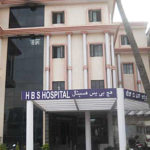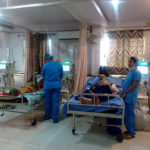Stepping into its sixth year, the HBS Dialysis Unit at Bangalore’s Hazrath Bismillah Shah Hospital is not merely providing dialysis at a considerably subsidised rate to patients but also considers the more holistic well-being of patients and their families.
By Nigar
Brick by brick, machine by machine, the Dialysis Unit of the Hazrath Bismillah Shah Hospital in Shivajinagar, Bangalore, has completed five years and is now in its sixth year of operations. It organized a “Kidney Day” programme on March 16, 2018 at the hospital.
Guided by Dr. Taha Mateen, Chairman and MD, Accura and HBS Hospital, and ably headed by Dr Zafar, the Dialysis Unit is more than a mere treatment centre for patients of kidney failure. Here, apart from the dialysis that the patients undergo, their social, economical, psychological problems are also given a patient hearing and consideration by soft-spoken Dr Zafar and his dedicated, 50-member team.
The HBS Dialysis Unit, which began with three dialysis machines and 12 patients in 2013, today has 260 patients, 40 beds and 40 machines (including 2 in the ICU). The machines, costing around Rs 5.6 lakh each, have been donated by many kind-hearted individuals. The dialysis sessions begin at 6 am in the morning and end by 2 am, with four shifts each day and around 100 dialysis per day.
Poorest of the Poor
The Dialysis Unit has been a boon to the poorest of the poor (who form the vast majority of the patients here). The charge for one session of dialysis is Rs 770, which is very reasonable compared to several other hospitals. Every month, some 3000 dialysis are done at the Unit. Out of these, some 1500 are done free of cost, the cost of this being covered by individual donors and organizations, says Dr Zafar.
What makes the HBS Dialysis Unit different and humane is that each patient’s social, economic and psychological condition is also looked into. Any poor family that has to take care of a member who has to be on lifetime dialysis goes through tremendous psychological trauma. The poor economic condition of many of these families adds to their plight. Patients and members of their family can easily fall prey to depression. Over 98 percent of patients who come to the dialysis unit here are extremely poor, Dr. Zafar explains. Many times, they have no money even for conveyance to the hospital for dialysis, and this worsens their condition. Some come breathless and have to be treated in the ICU.
Sponsoring the Education of Children
The HBS Dialysis Unit extends its support to patients in many other ways besides subsidized dialysis. One such way is by sponsoring the education of children of dialysis patients up to the ninth class. As of today, such 65 children are going to school thanks to a generous scholarship scheme. Some mosques in Bangalore are helping out in different ways to collect funds to provide financial assistance for the dialysis patients at the Unit and their families. Three meals a day (breakfast, lunch and dinner) are provided to the dialysis patients free of cost by different individuals and groups. Monthly ration bags, containing rice, daal, sugar, oil and wheat flour, are given to 185 families of dialysis patients. According to Dr Zafar, the ration bags reach the family even if the patient passes away. Patients who have to arrive at the Unit for dialysis from the outskirts of Bangalore or beyond can receive financial assistance from the Unit for transportation every month. Around 35 patients get this benefit. During the month of Ramzan, all dialysis is done free of charge. There is also an annual distribution of clothes and blankets for patients. Efforts are also made to organize funds for kidney transplant if the patients require.
Financially Stable
The Unit has also made noteworthy efforts in helping poverty-stricken members of families with dialysis patients become more financially stable. This issue is particularly important for families where the principal male bread-earner has to take dialysis and is unable to work. The Unit offers micro loans to help people start small businesses, such as running a tea shop or a vegetable and fruit cart, or a tailoring unit. The hospital has even employed 12 of its dialysis patients in different capacities.
The vision of the HBS Dialysis Unit is to have a holistic approach in its relationship with patients. While the dialysis machines take care of the clinical problems of the patients, the patients need kindness, generosity and concern, too, from others. There are many ways in which one can help out patients at the HBS Dialysis Unit. For example, by:
sponsoring a certain number of dialysis for one or more patients, once in a while or regularly
helping in kind”for instance, with cleaning materials, linen, bedding, etc.
counselling patients, many of who go into deep depression because they feel they are a burden on the family.
providing meaningful employment to dialysis patients or members of their families (since most of them are from economically very poor backgrounds).
For more details about the HBS Dialysis Unit, please contact Dr Zafar at: 9886751315.
Contributions for the welfare of patients can be made through cheque in the name of HBS Dialysis and sent to HBS Dialysis Unit, Hazrath Bismillah Shah Hospital, No. 58, Cockburn Road, Near Bamboo Bazaar, Shivaji Nagar, Bangalore- 560001).



COMMENTS